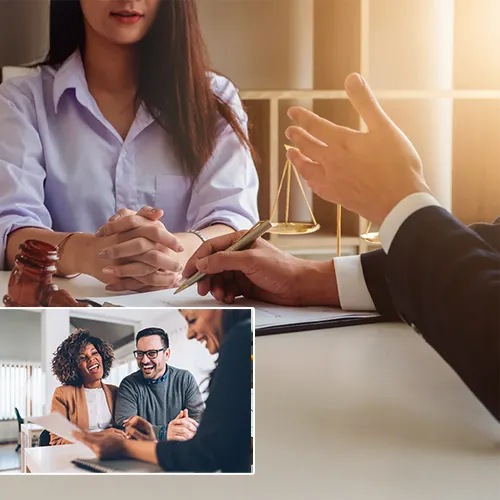Understanding DUI Checkpoint Legality: Your Rights and Laws
DUI Checkpoint Legality
Understanding DUI Checkpoints and Your Rights

DUI checkpoints, often referred to as sobriety checkpoints, are a common tool used by law enforcement to deter and reduce drunk driving incidents. At Fowler Kathryn Law Office, we realize the significance of such checkpoints and the complexities they present. It's not just about legality; it's about understanding your rights and the responsibilities of law enforcement. Our resources are meticulously crafted to ensure that you are well-equipped with knowledge, whether you're behind the wheel or seeking to understand the nuanced laws that govern these stops.
Navigating through a DUI checkpoint can be a stressful encounter. That's why it is crucial to be informed. We pride ourselves on providing clear, articulate information about DUI checkpoint legality so that you can proceed with confidence. Our collective aim is to illuminate the legal landscape for our visitors, allowing them to make educated decisions in the event of a checkpoint encounter. For more personalized assistance or legal queries, our experts at (512) 218-1536 are at your service.
What Are DUI Checkpoints and How Do They Function?
DUI checkpoints are police traffic stops that are not tied to any specific suspicions. Instead, vehicles are stopped in a sequence, such as every third vehicle, and officers briefly assess drivers for signs of intoxication. These stops are designed to be systematic to prevent discrimination, and their locations are often chosen based on statistical analysis of where incidents of drunk driving are more common.
The effectiveness of DUI checkpoints is predicated on their visibility and publicity. Law enforcement agencies often publicize upcoming checkpoints as a deterrent strategy. Though many drivers might perceive these stops as an inconvenience or a violation of rights, they have been ruled by the Supreme Court as constitutionally valid, provided they adhere to strict guidelines.
Understanding Your Rights at a DUI Checkpoint
At a DUI checkpoint, you still retain certain rights that protect you as a motorist. One of the most fundamental rights is the right to remain silent. However, this does not mean you can ignore lawful orders from an officer. You may also refuse to consent to a vehicle search unless the officer has probable cause or a search warrant.
Another crucial aspect people often ponder upon is whether one can legally turn around to avoid a checkpoint. This largely depends on local laws and whether, in turning around, you are committing a traffic violation. It's essential to know these details, and we can help bridge any gaps in understanding.
Legal Requirements Law Enforcement Must Follow
Law enforcement agencies operating DUI checkpoints must adhere to a set of legal standards to ensure these stops are constitutional. For instance, the decision-making process of whom to stop should not be arbitrary, locations should be chosen based on relevant data, and minimization of detainment time is emphasized. Safety protocols are also paramount.
Checkpoints that are not in compliance may be challenged in court, which underscores the importance of being informed. If you believe your rights have been violated at a DUI checkpoint, consulting with an attorney can clarify if proper procedures were followed and what recourses may be available.
The Implications of DUI Checkpoint Encounters

Encounters with law enforcement can be daunting, and DUI checkpoints are no exception. At Fowler Kathryn Law Office, we encourage you to remain calm and courteous during these interactions. Clear communication and understanding of what is expected can alleviate some of the apprehension. Remember, DUI checkpoints are not traps but means to promote road safety.
Moreover, we believe in the power of education. Knowing what to expect at a DUI checkpoint can facilitate a smoother experience for both the driver and law enforcement. If you're unsure about checkpoint protocols or concerned about a recent experience, simply reach out to us at (512) 218-1536 for expert guidance.
Do's and Don'ts During a Checkpoint Stop
When stopped at a DUI checkpoint, do keep your driver's license, registration, and insurance information easily accessible. Do stay calm and respond to the officer's questions politely. However, don't feel compelled to volunteer information. Remember, you have the right to remain silent beyond basic identification inquiries.
Don't attempt to evade the checkpoint by breaking the law or making unsafe maneuvers - not only could this result in more trouble, but it also raises suspicions. Lastly, if you don't agree with the officer's actions, do not argue on the spot, but rather note down the details and consult with an attorney later.
Scenario Simulation: Being Prepared for a DUI Checkpoint
Often, the fear and uncertainty surrounding DUI checkpoints can lead to panic. We recommend mentally simulating a checkpoint stop to prepare yourself. Think of how you'd interact with the officers, what documents you would present, and how you'd respond to potential scenarios. This kind of preparedness can significantly reduce stress levels.
Another tip is to have a plan if you've been drinking. Choosing a designated driver or using a rideshare service can prevent the necessity of encountering a DUI checkpoint while impaired. Always choose the safer option for yourself and others on the road.
Consequences of Failing to Comply at a DUI Checkpoint
Non-compliance at a DUI checkpoint may have consequences. If you refuse to stop or comply with the established procedures such as providing identification when required, you may be detained further, and additional charges could ensue.
Even though DUI checkpoints aim to catch drunk drivers, they are also looking for seat belt use, valid licenses, and other violations. Being cooperative and compliant can often expedite the process, allowing you to continue on your way with minimal delay.
Expert Legal Assistance Post-Checkpoint

Despite your best preparations, there may come a time when you need expert legal guidance following a DUI checkpoint incident. Our team at (512) 218-1536 is committed to connecting you with skilled attorneys who specialize in this area. They can analyze the specifics of your encounter and offer a strategy moving forward, ensuring your rights are preserved.
Whether you're facing charges related to a DUI stop or believe your rights have been infringed, legal support could be the deciding factor in the outcome. Navigating the legal system can be complex, and you don't have to do it alone. Our goal at Fowler Kathryn Law Office is to empower you with the necessary resources and legal representation.
Assessment of DUI Checkpoint Experience
If you've recently experienced a DUI checkpoint and are curious about the legality of the process or the legitimacy of any claims against you, a detailed assessment is imperative. Skilled attorneys can review the circumstances of your case and determine if all laws and regulations were correctly followed.
Understanding the nuances of each checkpoint stop is our forte. We encourage you to use our resources and, if needed, seek the guidance of our legal experts to unpack your situation.
Representation and Defense Strategies
In cases where you might be charged with a DUI or another traffic violation, having robust representation is critical. Our network of attorneys can develop thoughtful defense strategies tailored to your unique case. They can navigate plea bargains, court proceedings, and negotiations on your behalf.
If you're in need of legal representation, don't hesitate to reach out. We're here to connect you with attorneys who will fight for the best possible outcome in your case.
Post-Checkpoint Processes and Consultation
Post-checkpoint, you might face a range of processes from administrative to legal. Our consultation services can guide you through DMV hearings, court dates, or any other proceedings that stem from a DUI checkpoint incident. It's crucial to handle these processes properly to minimize impact on your life.
From obtaining police reports to coordinating your defense, we can streamline the journey for you. Allow us to be your guiding light through what can often feel like a legal labyrinth.
Navigating Legality with Confidence

Knowledge is power, and at Fowler Kathryn Law Office, we believe in empowering our visitors with an understanding of DUI checkpoint procedures and legality. Navigating these legal waters can be perplexing, but with our comprehensive resources and connections to top-notch legal experts, you can face these situations with confidence.
You're not alone when facing the complexities of DUI checkpoint law. For direct assistance, clarifications on legality, or to book an appointment with an experienced attorney, our team is just a phone call away at (512) 218-1536. Trust us to be your beacon of clarity in times of uncertainty.
Preparing Yourself for a DUI Checkpoint
To be forewarned is to be forearmed. Equip yourself with the necessary knowledge about DUI checkpoints before you find yourself in one. Our resources can prepare you well, and if doubts linger, our consultants are ready to assist.
Keep relevant documents in your vehicle, understand your rights, and if in doubt, always choose to seek professional advice. Your preparedness can make a significant difference in how smoothly a checkpoint stop can go.
Emergency Contact and Support
Urgent situations require immediate support. If you find yourself in need of legal assistance after a DUI checkpoint encounter, know that help is readily available. Sometimes time is of the essence, and we're here to respond to your emergencies.
Just a phone call can open doors to expert advice and emergency support. Don't hesitate; reach out to us for the help you need when you need it most.
Comprehensive Resource Center
Our website is not just about offering legal connections. It's a treasure trove of information, designed to educate and guide you on DUI checkpoint legality. We continuously update our resources to reflect the current legal landscape.
Dive deep into our extensive resource center to gain greater insight into the world of DUI checkpoints. The more you know, the better equipped you are to handle these situations.
In conclusion, while DUI checkpoints serve an important role in maintaining public safety, it's imperative for drivers to be aware of their rights and for law enforcement to execute these operations legally. Whether you seek knowledge for peace of mind or require legal assistance following a checkpoint encounter, Fowler Kathryn Law Office is your ally. We're devoted to helping you navigate these legal matters with ease. For any questions, resources, or to connect with an expert attorney, call us today at (512) 218-1536. Let us be your guide in asserting your rights and navigating the road ahead.
Previous Page
